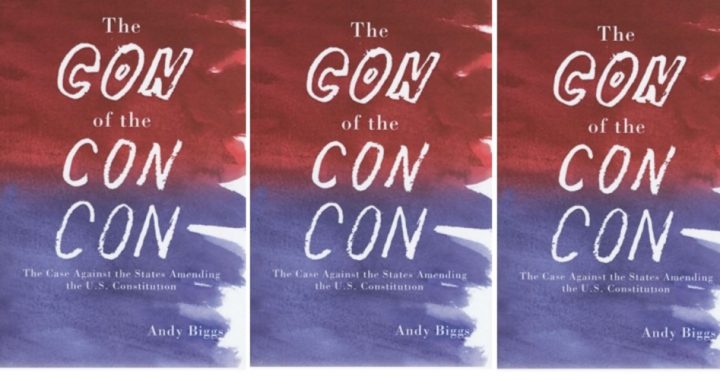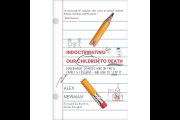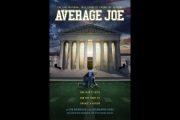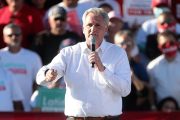
The Con of the Con Con: The Case Against the States Amending the U.S. Constitution, by Andy Biggs, Gilbert, Arizona: Free Man Press, 2014, 171 pages, paperback.
A seasoned veteran of the battle to protect the Constitution from those who would expose it to the dangers of a constitutional convention has just published a straightforward refutation of that proposal.
Andy Biggs, a state senator from Arizona and frequent foe of the con-con effort in the Grand Canyon State, is the author of The Con of the Con Con: The Case Against the States Amending the U.S. Constitution.
In 170 pages, Biggs exposes a dozen of the cons perpetrated by the pro-Article V convention crowd.
Each of these cons, Biggs argues, is rife with very risky and likely fatal flaws. Biggs believes the proponents of an Article V convention are so anxious to “do something” that they are willing to ignore these very clear and present dangers.
Article V of the Constitution establishes the methods of amending the Constitution:
The Congress, whenever two thirds of both houses shall deem it necessary, shall propose amendments to this Constitution, or, on the application of the legislatures of two thirds of the several states, shall call a convention for proposing amendments, which, in either case, shall be valid to all intents and purposes, as part of this Constitution, when ratified by the legislatures of three fourths of the several states, or by conventions in three fourths thereof, as the one or the other mode of ratification may be proposed by the Congress.
Biggs asserts that the forces behind the current con-con movement are purposefully pulling the wool over the eyes of their supporters by making them believe Article V is something that it is not: simple and safe.
The first of the cons exposed by Biggs is the (usually denied) belief espoused by con-con advocates that the Constitution is the root of the problem of federal overreach:
The position taken by Con-Con supporters implies that people simply don’t change unless directed. Indeed the natural conclusion is that they feel that the only way people change is by constraint. Thus, we need to change the structure; the Constitution. Con-Coners believe that we must change the Constitution in order to get the change we want.
True constitutionalists understand that the Constitution is not flawed, our enforcement of its provisions is, however.
The Constitution is our most valuable heirloom, and we can’t afford to expose it to the quick-fix repairs being offered in the name of “reining in the federal government.”
Instead, those of us committed to preserving, protecting, and defending our Constitution should begin devoting the time and attention necessary to the restoration of the powerful term limit control mechanisms included in the original design of the Constitution.
Biggs does an admirable job of informing Americans and the Article V advocates that we can take care of ourselves, and we can control the federal government, and we don’t need a constitutional convention to fix what we already have the power to restore.
Who is to blame for the precipitous decline in the adherence to constitutional principles? Biggs has a theory:
We are a self-governing society, or that’s what was intended. That means that the people are invested in America and how it is to operate. We must determine our government. We, the people, have ceded our governance over to an elite, who have abused us for over one hundred years. That cadre of rulers has built regimes, institutions, and infrastructure to support their positions of power. We have let them.
Americans are free no longer. We are no longer governed; we are ruled. In the current environment we cannot reasonably expect equal treatment before the law. Our right to succeed now comes with constraints imposed by a degenerate government elite.
Americans must reclaim the legacy of liberty bequeathed to them by the framers of our Constitution. We have the power, now we need the will. With our eyes firmly fixed on that noble goal, we can, Biggs believes, return the government to its constitutional moorings.
Biggs is no wide-eyed utopian, however. He recognizes that forcing the federal beast back inside its constitutional cage will not be easy. As a first step in pursuit of that worthwhile endeavor, Biggs advocates for a reinvigorated American electorate, willing and able to identify and elect trustworthy representatives:
It isn’t necessary to pass one, or a few or even many conservative amendments to the Constitution to rehabilitate the American idea. It is more imperative that we have leaders who will be true and faithful to their Oaths of Office. The American voter must become more vigilant and aggressive against governments’ ever increasing encroachments. Americans must seize the moral highroad. We must be good if we are to have good leaders.
Readers will see in Biggs’ suggestions a shift of obligation for rescuing the Republic away from the oligarchy currently in control of the federal government back to the ultimate sovereigns: the American people.
Rather than seeking to recover our liberty by placing new restrictions on federal power, Biggs recommends the re-enforcement of those restraints that already exist. In other words, Biggs promotes following, rather than fixing, the Constitution.
The bottom line is that when it comes to derailing the long train of federal abuses, Biggs trusts the people of the United States. “I believe that America’s salvation lies in two places,” he declares, “the people and the states.”
If those two forces could combine against the con-con promoters, the battle for freedom could be won.
The next con called out by Biggs is that of the misunderstanding of the details of the Article V process, a misunderstanding painstakingly promoted by the leaders of the con-con movement:
Even though much of the angst over the path of the United States is a result of Congressional action, the Constitution provides a role for Congress within the Article V amendment process. Other opportunities for mischief indicate that the difficulty of getting something just right out of the process is extremely unlikely. We ought to be discussing the likelihood of something just wrong emerging from the process that will accelerate our national dissolution. It is, unfortunately, a con that leaders in the Article V movement play down these issues. The con is the lack of transparency, or frankly, the lack of truth in explaining the parameters and pitfalls of the Article V process.
After reminding readers of the myriad dangers of this deception, Biggs launches into a full-throated warning about just how easily an Article V convention could be “hijacked”:
It isn’t the process itself that “could hijack the convention.” It is the delegates to that convention, and other people at any number of other points in the process, who may attempt to take over the Article V Process. But, the biggest problem with the statement is that it indicates that Article V is a simple process when in reality it is a difficult procedure with many points at which it can be commandeered by malevolent actors.
This particular misdirection, Biggs insists, is being carried out by the Compact for America (CFA) organization.
This con includes a promise that the process can be “pre-packaged” to obviate many of the risks otherwise inherent in the Article V amendment mechanism. Specifically, the Compact for America guarantees a convention that is controlled from beforehand, a convention attended by delegates unable to push the process down a destructive path.
Described by Nick Dranias — one of the chief promoters of the Compact for America — as analogous to a “house loan closing,” the various steps laid out in his proposal actually work together to construct a Trojan Horse.
Many state legislators determined to stand up to Washington would likely welcome the Compact for America and the state compact it offers as an ally in their battle. In fact, the CFA is so thorough that the state compact contains “all the legislation necessary for the Article V process to work.” Therein lies the principle defect of this program.
As harried and overworked as they are, not all state lawmakers legitimately enlisted in the war against federal despotism would understand that by joining the CFA they would also be agreeing to set in motion a constitutional convention that could quite possibly throw the baby of the Constitution out with the bathwater of out-of-control federal spending.
The bottom line is that the outcome of such a con-con could range from a textbook following of the CFA script for proposing a balanced budget amendment and nothing else, all the way to a runaway convention based on the right of the People in convention to revise their government when it becomes destructive of the ends of securing our God-given rights. This is the crux of the argument against convening an Article V con-con, no matter how loudly the proponents of such a convention assure us that they can limit the number of amendments and/or the content of the amendments that would be considered.
As the preceding prediction demonstrates and as Biggs so ably explains, the Article V convention process is heavy on questions, but light on answers. Biggs asks a couple of these questions, questions habitually dodged by the con-con congregation:
Do the potential benefits outweigh the potential costs; and 2) Will any amendment proposed by the Con-Con-ers produce the transformational change in America? The answer to both of those questions is no!
Another problem pointed out by Biggs is the identity of those who would be elected (or appointed) as delegates to an Article V convention. In his book, Biggs predicts that the same cast of characters who have committed the crimes against our Republic would likely be in control of a con-con. That would be catastrophic for our Constitution.
The fact is that determined citizens and state legislators could rescue the United States from its financial peril without resorting to opening up the Constitution to tinkering by governors [as proposed by the Compact for America] and a sprinkling of state-appointed delegates, many of whom would be bought and paid for by special interests and corporations.
Thomas Jefferson wrote: “If a nation expects to be ignorant and free … it expects what never was and never will be.” A fundamental requirement of vigilance is holding elected representatives’ feet to the fire by compelling them to honor their oath of office and not exceed the limits of their power as set forth in the Constitution.
Make no mistake, if the Constitution is opened up to the tinkering of these tinhorns, the moneyed interests will be present and their irresistible influence will shape the product of the Article V process.
Take a look around the country; one can see what a new constitution would look like. With the Supreme Court’s recent ruling forcing states to recognize gay “marriage” and another upholding the constitutionality of the legal plunder that is ObamaCare, there is no limit to the panoply of “rights” that would be pursued by the con-con 2.0 delegates.
Furthermore, balanced budget amendments (which overlook the fact that most of the spending is unconstitutional), term limit amendments, and the various “power to the people” amendments backed by the socialist wing of the Article V movement are all, in one way or another, contrary to the intent of the Founders and to the principles of liberty they enshrined in the Constitution.
Remember, no matter how “conservative” or “constitutional” a group or individual claims to be, if their proposed amendments change the basic structure of the Constitution or alter the delicate balance of power created by the Constitution, then you should realize that although their lips draw near to the Founders, their hearts are far from them.
Perhaps the principal theme of Biggs’ book is that the American people are the last and best hope for rescuing our Republic. If we expect things to change, we must stop relying on politicians and establishment elites to “fix” a Constitution that is not broken. In fact, these people are the prime perpetrators of the assaults on that sacred document.
Biggs calls on all of us to take up the burden of restoring the Constitution. His counsel reminds one of Benjamin Franklin’s warning that “it is in the region of ignorance that tyranny begins.” Biggs predicts:
As we actively work to educate and make system changes within our state electoral processes, we will see people elected who will be true to their oaths to adhere to the Constitution.
The Con of the Con Con is a powerful weapon in the arsenal of those fighting to enshrine the Constitution as the law of the land and to protect it from the multitude of threats lurking in the shadowy recesses of Article V.
Andy Biggs’ book not only fearlessly exposes the errors shamelessly committed by the con-con crowd, but it exposes the questions that that movement just can’t — or won’t — answer.



